
|
|
Dream Eater Merry
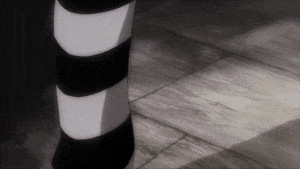 They're a mean teen daydream team, dreamin' up schemes to demean demons unseen! Dream Eater Merry is a show that I'd somehow never heard of until it appeared in an Amazon search when I was looking up some other DVD set for my collection back in 2012 or so. I remember thinking at the time that the name and cover art looked pretty cool and - just as I do with countless other shows - casually tossed it into my dragon's hoard of To-Watch List titles without a second thought. The List is so massive at this point that it takes an absurdly long time for me to get around to watching anything I say I will, but it all does eventually get watched. I like to keep the List somewhat random and heavily varied, to ensure that I'm watching not only the stuff I know I will like, but also the obscure and forgotten titles as well. In Dream Eater Merry's case, it took almost twelve years for the show to wriggle its way up to the top of the List, and by that time I had completely forgotten all forms of synopsis or reasoning as to why I even added it in the first place. It's fair to say I went into the show completely blind. And I was promptly reminded exactly why I love doing things this way.
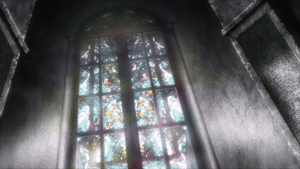 I don't write a review for every show I watch, but when lightning strikes, it strikes hard! Running for a single 13-episode season, the 2011 Dream Eater Merry anime is adapted from a much-longer manga series that was actually still ongoing until about 2020. This of course means that the anime only covers a fraction of the original story, and diverts off in its own direction in order to wrap itself up as a one-season affair, leaving plenty of open ends in case it ever got renewed for more episodes. Given it's been 13 years since it ended, it's very unlikely to see anything else get animated. As I've mentioned in other reviews for incomplete adaptations, I will review the show for what it is, not for what it isn't, so read this review as if the rest of the manga doesn't even exist.
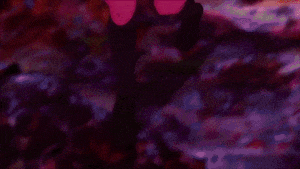 When passion's a prison, you can't break free... As the title implies, this is a show mostly about dreams, but more specifically it's about humans and demons. In this world, demons operate on a layer above humanity referred to as the Dream World, and can "cross over" into a human's body via their dreams. While some demons seek to possess humans as vessels for some inevitable larger invasion or war, many demons are not hostile at all and only seem to inhabit humans out of curiosity, or even some kind of symbiotic relationship. The kicker is that once they've taken residence inside a human, demons reportedly cannot ever return to their Dream World. Enter Merry Nightmare, a dream demon who has somehow broken the laws of dream physics and exists physically in the human realm. She doesn't remember how or why she ended up here, she just knows that she wants to go back, and is getting increasingly frustrated that her fellow dream demons might know something that they aren't telling her. While earth-bound, she meets up with a human high school student named Yumeji, because of course she does, and he decides to help her figure out what's going on by having her stay over at his house. Yumeji's a good-natured but average kid who wants to be a writer when he grows up, but he does have one significant quirk: his ability to predict people's dreams using his special eyes. A pattern emerges when his classmates start having weird nightmares and daydreams, and if Yumeji or Merry is within a certain proximity when it happens, they find themselves pulled into a little pocket dimension where the "daydream" encounter takes place. And it is there that the demon attempting possession appears and can be dealt with.
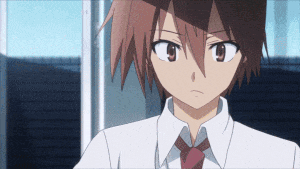 We tend to always the see the worst in ourselves, but sometimes that shadow you cast is not your own. Right off the bat, I was struck by the show's gritty, modern-gothic art style and knack for presentation. The plot of the series takes place in two worlds, the everyday Human one and the demonic Dream World, but rather than diametrically contrasting the two, the show makes a solid effort to stylize both with equal darkness and light. The Dream World calls on surreal fantastical environs of empty wheat fields and abandoned dock warehouses and rusty Victorian clock towers, but is lit up by flashes of lightning and stained glass windows, adding a layer of beauty to the otherwise stark and washed-out backgrounds. Likewise, the everyday Human world is more expectedly colorful up front, but frequently cuts away to dark contemplative shots with grungy shadows or ominous pause shots. The show's whole aesthetic is excellent, and feels very refreshing compared to the super-clean modern anime I've been watching a lot of lately. And it's not just the backgrounds that took me by surprise. This anime came out in 2011, but it felt even older than that, drawing on that sort of unhinged and experimental nature of the early to mid 2000s. Merry's character design harkens back to the Hot Topic era of lolita-style magical girls, combining a punky crop top and miniskirt with an oversized jacket that still retains its whimsical curlicue tails, and a pair of striped stockings with platform shoes and a cute ribboned sun hat to tie the whole look together. She's not goth in the same way that Magia Baiser of Gushing Over Magical Girls is, but she fits the bill as a potential icon of the 2000s goth era. I'm kind of surprised I haven't seen more fan art of her over the years, but I suppose she was just a little too late to the game.
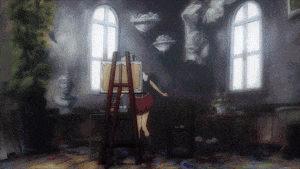 I can't stress enough how stylish this series is, even in its quieter moments. Aside from its keen visual style, I also found myself drawn in by the mystery and surprising complexity of the story. Initially it seemed like Yumeji and Merry were going to be a sort of teen detective duo specializing in the supernatural, but as I mentioned before, not all demons in this world are inherently evil. Many of them even seem to befriend those whose dreamspace they occupy, and serve the same function as imaginary friends, guardian angels, or childhood heroes. Merry seems very distrustful of the demons though, and seeks to fight them in the dreamspace in an effort to send them back where they came from, even though she is unable to do that to herself. Meanwhile, Yumeji - having just been introduced to all this demonic possession stuff - only wants to protect his friends from danger, using his special eyes to identify who among his classmates will suffer the next nightmare. Thus, the two of them have everything to gain by sticking together until they can unravel the mystery of where these demons are coming from, and what their ultimate goal might be.
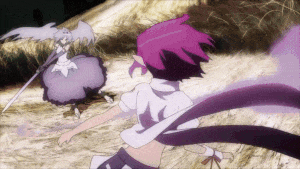 The fight scenes are often choreographed in disorienting, semi-fluid ways that really accentuate the dreamlike nature of the show's visual style. The other core aspect of the story pertains to the other meaning of the word Dreams, as in "hopes and aspirations". Students all around the school begin suffering a mysterious condition called "dream loss", wherein they very suddenly lose all passion and interest in achieving or becoming anything later in life. It is eventually revealed that there's one particularly powerful demon (Mistleteinn) hanging around the school, implanting lesser demons in the students' dreams and encouraging them to latch onto their host's innermost ambitions. Mistleteinn then stops by in person in her own daydream to coax the demon out of hiding and viciously rip them to shreds, killing both the demon and the hopes and dreams they had linked themselves to all in one go, subsequently making each student completely hollow and lifeless inside. It is suggested that Mistleteinn is working as some kind of right-hand to Heracles*, the so-called leader of the demons, seeking to crush humanity's aspirations and leave them all empty husks - ripe for possession - to facilitate the creation of an army for Heracles' bigger picture war/invasion. Much like The Nothing destroying the world of human fantasy in The Neverending Story, Mistleteinn represents the Gmork, hunting down the heroes at her own sadistic expense, whether or not she is actually doing so for Heracles' own benefit. *Research shows his name is supposedly billed as "Hercules", but - possibly for copyright reasons - the English dub very specifically goes out of its way to pronounces it "Heracles".
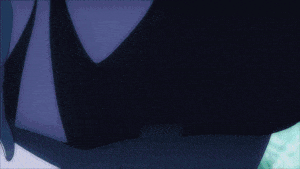 "People who have no hopes are easy to control. And whoever has the control...has the power...". To spoil a deliciously evil twist, the human vessel being possessed by Mistleteinn just so happens to be the school teacher himself. It's a perfectly horrible irony: a soft-spoken teacher asks his students about their career aspirations and innermost desires, then later pulls them into a twisted daydream, and viserally kicks the shit out of them while Mistleteinn slices their dream to pieces, mocking them all the while. The grim reality of shattering kids' ambitions in favor of making them mindless cogs in society's machine brings the whole "dreams" motif of the show right into focus and really ties the whole story together perfectly. Even though Merry's plot is never resolved nor fully explored, that angle alone made the whole anime worth watching for me, and absolves it of any missing details that might have been found in the source material.
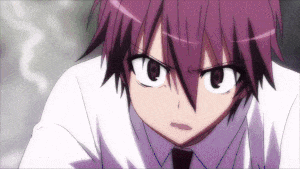 For all the show's mysterious and evocative imagery, this one really beats you over the head with its blatant symbolism, and I LOVE IT. All that said, I don't really have any negatives to discuss here. There is a frequent and unfortunate issue of camera framing that seems weirdly fixated on Merry's navel that I know some people will be put off by. Given that she's meant to look like a young teenager, it's prominent enough to feel like we're staring at her, which is certainly a bit uncomfortable (especially for people like me, who are too old to be staring at teenagers). Then again, there's nothing inherently sexual about belly buttons, so any perceived feelings of "lewdness" probably lend themselves more to projection than an actual issue of voyeurism. I also found the soundtrack a bit odd. I wouldn't call it bad, but sometimes it came across as very...I dunno, flat? Minimal? Under-produced? There were times where it hit hard (for example, an eerie meandering violin tune that played during mysterious reveals in the dream world), and other times where it felt completely underwhelming (a warbly bluesy synth solo that accompanied the slice of life moments in the human world). There were a number of scenes paired with off-kilter track choices as well, which I suppose might have been intentional, meant to underscore the surreality of the dreamworld fights. Suffice it to say, I didn't hate the soundtrack, but it certainly didn't behave as expected.
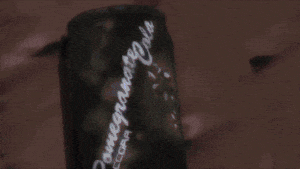 There's a strange recurring visual of a can rolling by that's used throughout the series, and I like that it was never remarked upon or offered any explanation. I feel when modern shows include visuals like this, they always feel compelled to attach some kind of meaning or significance to them. Here though, it simply remains a random gag, and I love that. To sum it all up, I actually enjoyed this show a lot more than I thought I would. The experimental semi-gothic art style is intriguing and alluring, the story and setting really sucked me in slowly but surely, and the overall theme of dreams (whether speaking literally, semantically, or even metaphorically) nailed its landing and even left itself open-ended in case another season was to ever be produced. If you're a Lore hound or a stickler for narrative, you'll likely be put off by the unresolved and unexplained plot points of the series, but hey, congratulations, there's a whole manga series you can read instead. For me, I would totally welcome another season of the anime, but I'm also perfectly satisfied with leaving it here, as I felt the season still completed the story it intended to tell. Strongly recommended for fans of other goth-esque magical girl type shows like Rozen Maiden and Princess Tutu, or off-beat magic fantasy series like Tweeny Witches or W.I.T.C.H. For more anime with similarly stark visual identities, you might like something in another genre such as C: Control or maybe even something a bit more extreme like SoulTaker. Well, maybe. If you liked the style and theme of Merry but there wasn't enough fighting for your tastes, I would push you toward something more like Soul Eater instead.
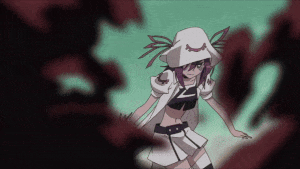 I'm a simple gal. I see a masked cat guy in a tattered cloak with a guillotine blade in the very first episode, and I'm a simple gal. Always a thing of beauty when I blindly add a show no one ever talks about to my List and it turns out to be 100% my kinda jam. I hope some of the other random titles I put on there turn out this good as well!
|
|